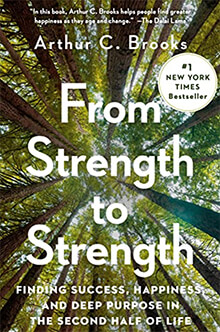 Book Review by Myra Salzer
Book Review by Myra Salzer
This book was recommended to me by a friend and colleague who is older, wiser, and more at peace with his life than I am. The book was intended for people who want to feel better about themselves and their lives after their years of maximum earning and physical vitality are behind them. While I certainly fall into this category, I found myself resistant to checking the “box” of old age. Dammit! I still have a long life ahead, and I love what I’m doing.
While the “peace and tranquility yoga-babble” in From Strength to Strength felt seductive, I’m not ready for it yet. Perhaps I never will be. Nonetheless, there were many other learnings that resonated with me throughout. I will write out some of the highlighted quotes and points that were made, the first of which you have probably heard many times when the discussion is about the difference between knowledge and wisdom:
“Knowledge is knowing that a tomato is a fruit; wisdom is knowing not to put it in a fruit salad.”
One lesson I learned that has nothing to do with aging and everything to do with investing and/or life in general is as follows: “Prospect theory challenges the assumption that people are rational agents who assess gains and losses the same way; in fact, it asserts that people are much more affected emotionally by losing something than they are by gaining the same thing.” Another lesson that can relate to investing as well: “satisfaction = what you have ÷ what you want.”
Another quote I relate to: “If you spend your time thinking about and working on your legacy, you are already done.” Many financial planners help clients consider what they want their legacy to be. I would rather spend time coaching clients on what they want their life to be.
From Strength to Strength touches on the importance of community, and how in the second half of life, especially after one retires, community may be harder to create. However, as Paul Tillich put it in his book, The Internal Now, “Solitude expresses the glory of being alone, whereas loneliness expresses the pain of feeling alone.” I can relate to savoring my alone time, but I cannot relate to often feeling lonely.
So, what did I learn from the book, and how can I apply it? I learned that the choice to commit to personal growth and expansion continues throughout all stages of life. I continue to choose to grow and learn and expand as well. My choice just so happens to be through my work, which, in addition to family and friendships, is my purpose.